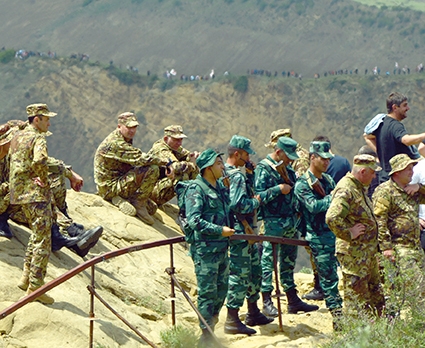Vox Populi, Vox Dei
Op-Ed
A couple of months ago, it was a plain border issue between two good neighbors – dormant for years and not much of anybody’s concern. And right out of the blue, it turned into a huge discussion between the two nations. God forbid it happen, but the impression is that the Georgian-Azeri once bombproof friendship is slipping through our fingers, and their longstanding mutually beneficial cooperation is failing into the bargain.
It is very difficult to say anything new about Davit Gareji, a Georgian Orthodox monastic complex situated about 70 kilometers southeast of Georgia’s capital, which includes hundreds of cells, churches, chapels, refectories and living quarters carved into the rock. Part of the monastery is located on the Azeri territory and has become the theme of a land dispute between Georgia and Azerbaijan. According to pertinent reference books, the area is also home to protected animal species and evidence of some of the oldest human habitations in the region.
In a word, the place is significant from the standpoint of preserving and protecting globally recognized cultural heritage, but fate would have it that this wonderful cultural monument stand in such an awkward geographical position that quarrels become inevitable on the topic of historical ownership rights between the two good friends, both sides being fair and innocent in dealing with the quandary.
Both governments felt unperturbed and behaved with certain sluggishness for many a year in terms of delimiting the borders between the two states. When a simple naive comment of an unsuspecting human sparked the controversy on the Davit Gareji subject, diplomacy came into play in order to prevent further deterioration of old sociable relationships. But public manifestations still persisted because the prevailing overall sentiment prompted the crowds that not enough negotiating energy was being used to quench the fire. The disputable site was revisited by protesting Georgian enthusiasts under an extremely benevolent but totally meaningful slogan: ‘Gareja is Georgia and the Caucasus is our home’.
That Caucasus is a mutual dwelling place for all of us, the denizens of the Region, is an old subject matter for discussion from times of Georgia’s first president, who perpetuated this appealing idea but never saw it come true. The manifestation intended to demonstrate the flags of all three Transcaucasia nations – Armenia, Azerbaijan and Georgia. The political connotation of this kind of symbolism is humongous, going far beyond the dispute about one singled out cultural monument, no matter how significant the maintenance of it is for any of the sides.
The statement made by the organizers of the public demonstration says: “This is going to be a sign that we do not want a feud with anybody, especially in our home, with our brothers, the peoples of the Caucasus. With this manifestation, we are giving a heads-up to any interested force that nobody will be given a chance for any provocative action to upset our big home nor will the region come under a destructive blow. We believe that this day in Gareja, we will see next to ourselves the Georgian citizens of the Azeri ethnic background, telling the world and their historical motherland straight from this priceless-for-Georgians sacred soil that there are no borders in friendship and brotherhood, which may never be shadowed by the guided politics of an unintelligible and presumably interested force.”
There could not have been written or said any better or stronger words to make a statement of this significance, corroborating once again how balanced and reasonable this nation can be at crucial historical moments. The current Georgian government does not have a better helper and promoter than its own wonderful people because the voice of the people is indeed the voice of God!
By Nugzar B. Ruhadze
Photo: Azeri soldiers (in blue) face Georgian protesters in David Gareji. Photo by Peter Nasmyth












